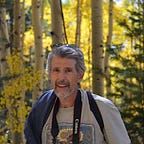Speedometer-Brain and Censorship
So who exactly is super-competent to act as a censor of speech?
The answer, according to Neuropsychology, is “no one”.
No Brain Speedometer
The why is illustrated by the story of one of my neighbors, a person who can often be seen monitoring traffic flow in front of her house and waving down drivers. One day, waved down while traveling below the speed limit of 25 mph, I felt compelled to pull over and enlighten her on the topic of her visual perception. My summary message was, “you do not have a speedometer in your brain”.
The longer version was this. It’s been demonstrated psychologically and verified biologically that perception is always biased by experience. While the retinas of our eyes sense patterns of form, color, and motion, a registration of outer reality, the same cannot be said of our visual perception. What we actually perceive is a synthesis of the information coming from our retinas with information coming from our experiences, emotions and desires. In other words, perception is biased by experience, by memory and its emotional content. To my neighbor, it meant that her perception of my vehicle as speeding was unreliable, because it was deeply colored by her experience of traffic flow on her street and her anxiety about her dogs being injured. I could’ve been traveling at 10 mph. It would have nonetheless been possible for her to perceive that I was speeding despite the contrary information coming from the retinas of her eyes. Or from my car’s speedometer.
Synthetic, Not Registrative
Another way to say this is that sensory perception is synthetic, not simply registrative. This is amply demonstrated by the biological fact that our brains process information about the shape (form), color, and motion of an object separately. The output of these sub-systems is then somehow synthesized into a unified percept. Visual perception is a fundamentally synthetic process.
But beyond this baseline brain synthesis is the further combination of the form-color-motion data with the aforementioned inputs from memory and emotions. Once again, what we ultimately perceive is quite different from the registrative process of light →lens → film/photodiode → image registered by a camera.
So, if as demonstrated by visual perception, our brains synthesize (not register) external reality, let’s apply this to the question of censorship. It is simply impossible to find a person to be an unbiased judge of what kind of information should be censored as “dis-“ or “mis-information”. Regardless of a set of criteria against which to judge, each person’s education, experience, socio-economic-political preferences and emotions will influence this perception. The same words register on each prospective censor’s retinas (or inner-ear hair cells, if spoken), but how they’re perceived in relation to these criteria is simply not free of the experience and biases of those individuals. And if you’re tempted to shout “algorithm,” I urge you to recall that human beings write the code for those algorithms.
The Biased Censor and Speech
As Noam Chomsky warned us, “if we don’t believe in freedom of expression for people we despise, we don’t believe in it at all”. Given neuropsychology’s view of the problem of the unbiased censor, free speech — for everyone — is the only sane answer. Speech that causes actual physical, emotional, or financial harm that breaks the law, such as in civil suits for slander or character defamation, or for copyright violations can be adjudicated in courts. Speech clearly causing or threatening public harm such as the classic shouting “fire” in a crowded theater is already illegal. The FCC (supposedly) regulates speech on the airwaves. Otherwise, speech must remain uncensored if we truly aspire to the appellation “democratic society”. Whether the justification is disinformation or counter-disinformation, the distinction is irrelevant in practice.
